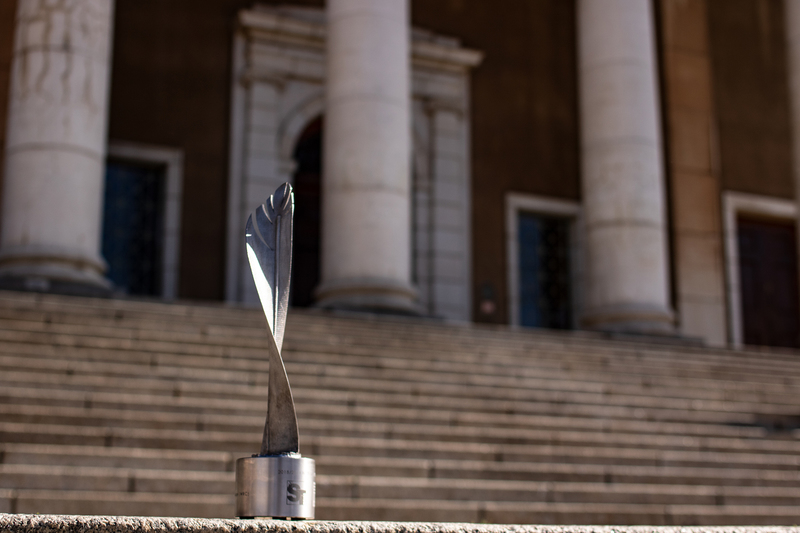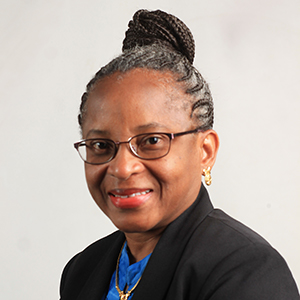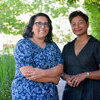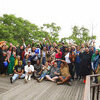UCT engineer awarded ‘science Oscar’ for capacity development
31 July 2020 | Story Nadia Krige. Photo Libby Young. Read time 7 min.
In recognition of her outstanding contribution to the development of research capacity in the field of engineering, University of Cape Town’s (UCT) Associate Professor Abimbola Windapo was one of the recipients of a prestigious National Science and Technology Forum (NSTF)–South32 award during a virtual event last night.
Also known as the ‘science Oscars’ of South Africa, the NSTF–South32 Awards were established in 1998 to recognise outstanding contributions to science, engineering, technology and innovation by professionals, teams and organisations in South Africa.
This year, 141 award nominations were received by the NSTF.
“I am excited about receiving this award—a recognition of ten years of research work at UCT.”
Windapo was one of six finalists for the engineering research capacity development award and named one of two recipients. The award is made to one male and one female researcher who have shown exceptional dedication to training, nurturing and mentoring students in the construction discipline.

The award also recognises these individuals’ tenacity in confronting problems of poor project and organisation performance from a practice perspective.
“I am excited about receiving this award—a recognition of ten years of research work at UCT,” she says.
In pursuit of sustainable construction
Windapo is an associate professor in UCT’s Department of Construction Economics and Management. She started her work as a response to the high failure rates of many construction companies in South Africa, as well as the construction industry’s poor health and safety records and the need to adopt sustainable construction techniques in line with the United Nations Sustainability Development Goals.
Over the past 10 years, Windapo has demonstrated that the construction techniques used by industry stakeholders are not aligned with sustainable principles, which contributes to the general underperformance of construction projects.
Her research has uncovered that construction companies will only comply with building, environmental, health and safety regulations if there are economic benefits attached, and that product and geographical diversification of the construction industry has produced sustainable growth and development of construction companies.
Capacity building
Through her research, Windapo has contributed greatly to the furtherance of the business of construction and management education in South Africa at the tertiary levels.
Her findings are used in training the next generation of industry professionals and scholars about the processes involved in the delivery of large engineering projects and the important satisfaction metrics that should be considered in the procurement of the infrastructure as well as knowledge of the factors influencing the quality of design documentation.
Windapo’s work has also been used as a basis for further studies and in framing topics for honours, master’s and doctoral research. A number of these graduates have attested to the positive impact that the knowledge of construction business and project management is making in their workplaces.
A virtual celebration
Due to the COVID-19 pandemic, the NSTF-South32 Awards gala dinner took the form of a live-stream broadcast on the NSTF’s YouTube Channel. Recipients acknowledged their awards via live- or pre-recorded video message, depending on their availability and connectivity.
Apart from the 13 sought-after awards that were presented to researchers, the virtual event was also a celebration of the 25th anniversary of the NSTF’s founding.
Her research has uncovered that construction companies will only comply with building, environmental, health and safety regulations if there are economic benefits attached.
“The irony is not lost on us that without technology and science, the excellent event simply wouldn’t have been possible this year,” noted Mike Fraser, chief operating officer of South32.
In his opening address, NSTF chairperson, Professor Ali Dhansay, pointed out that the Covid-19 pandemic has highlighted the importance of scientific research and innovation in combatting the current – and preventing future – outbreaks. It has also, however, given rise to the spread of fake news and conspiracy theories, which have put trust in science under threat.
“The bulwark against this is to retain one’s integrity, not compromise on principles and values – both personal and professional – and to be aware of one’s weaknesses and be ready to change one’s opinion based on evidence and scientific rigour,” he said. “There’s no place for hubris and arrogance. Let us exhibit humility and humanity in our actions.”
Now more than ever, he added, clinicians, researchers and policy makers need independent evidence and open debate to inform the work they do.
Windapo echoes these sentiments: “STEM (science, technology, engineering and mathematics) is critical in these times of fake news and conspiracy theories, because [among other things], it is essential to understanding the problems affecting society in a structured and systematic way, cutting through obscurities,” she says.
 This work is licensed under a Creative Commons Attribution-NoDerivatives 4.0 International License.
This work is licensed under a Creative Commons Attribution-NoDerivatives 4.0 International License.
Please view the republishing articles page for more information.










